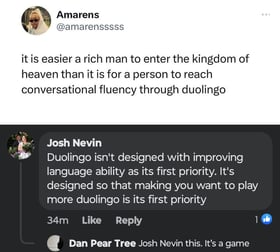
Catching Up
Sorry, but it's gotta be done
Artie Duncanson
6/28/20238 min read

I want to post the inner workings of Viglo in real time, but for now, we need to play a bit of catch up (since I didn't think to write the Viglo autobiography until after we already started developing it). I want to keep these posts very short and easily consumable, but this will certainly not be one of those kinds of posts since there's a lot to catch up on. Therefore, I put this full post into ChatGPT and asked it to summarize the post for you into something that could be read in under a minute. ChatGPT's summary will follow this paragraph. But if you're curious about what I wrote, my original post can be read immediately after the ChatGPT summary. Whatever you choose, enjoy it!
ChatGPT Summary:
I've been hard at work on the newest iteration of Viglo, my Spanish language learning app, and I'm excited to have my talented programmer friend Kendro on board. I learned from my previous attempt at Viglo how crucial a business mentor is, and I'm now benefiting from guidance right from the beginning. One major piece of advice from my mentor was to focus on monetization early on, leading me to develop a unique payment system that lets students see their progress before deciding what they wish to pay.
While considering what would make Viglo attractive to users, I initially thought about adding features like detailed stats and fun graphics. However, I realized I need to focus on customers truly dedicated to conversing in Spanish and aligned with Viglo's goals.
After wrestling with various customer bases, including college students, aviation workers, and others, I decided to target digital nomads. This demographic is young, open to new technologies, and increasingly found in South America. The monetization plan and guidance from my business mentor give me confidence in Viglo's ability to provide value, and I'll continue to focus on delivering a great product while balancing the business side of things.
My Original Post:
I discussed two posts ago what Viglo is and how it will work. When I had fleshed out the new idea a bit more, I reached out to one of my best friends and incredible programmer named Kendro. He worked on all the previous iterations of Viglo, and I'm thrilled to have him ready to give Viglo another go.
With Kendro on board, I did what I have no doubt is one of the most important things anyone like me could do when starting up a business... get a business mentor. In my first attempt at Viglo, I didn't get a business mentor until years after I founded it. It wasn't until he shared his advice that I realized how truly ignorant I was in regards to thinking like a businessman. Unfortunately he came too late to bail out that sinking ship, but his advice did manage to get Viglo earning money before I shut it down. To anyone new to startups, I can't begin to stress how important finding a business mentor is. They are going to reveal thought processes that will save you so much time, resources, and effort. One of the reasons I'm so confident in resurrecting Viglo is because my business mentor is helping me from the beginning (and already has diverted me away from bad decisions before the first prototype of Viglo has even been released). I'll stress it one last time, if you're new to starting a business, find a website that connects entrepreneurs to business mentors, and you'll be putting your business so far ahead of those without mentors.
One piece of advice my business mentor gave me was to get a monetization plan as soon as possible (even though I want to just focus on the product itself). An industry standard for language programs is a monthly subscription to access your service, so that's what I started thinking I'd do. But what features will Viglo have that will compel people to pay for it?
I really like the AI generated lessons that Viglo is implementing. I've tried it myself, and it's definitely going to skyrocket my Spanish skills. So Viglo will certainly bring value to those who actually care about conversing in Spanish.
I say "those who actually care about conversing in Spanish" because I've realized that that's not the motivation for many language learners. I have read a lot of comments from people that use Duolingo, the most popular language learning app in the world, and everyone was gushing about how much they loved it. But a lot of comments would follow up the praise by admitting that they cannot converse with any confidence in the language that they've spent massive amounts of time studying. They have the usage streaks, lessons completed, and have played every game, but come away with no ability to communicate in real life. I've never spoken directly to any of the commenters, so I can only speculate as to why they love Duolingo, despite being unable to converse after using it. Duolingo is a gorgeous app that's designed like a game, and so I believe they are just attracted by the bells and whistles of the app, more than it's effectiveness.
This made me believe that I too should pin bells and whistles all over Viglo in order to attract customers. To do that, I wanted to collect a bunch of stats from each call; normal things like number of lessons completed, new vocab you worked on, total time spent on calls, and so forth. But then I was going to generate wacky stats as well, including the amount of electricity you've consumed using Viglo. I would take these stats, make sure they were presented in an appealing way, and this is how I would attract customers to Viglo.
Slowly I realized that by making preparations to attract Duolingo's customers, I was figuring out how to attract DUOLINGO'S customers. (duh) But are Duolingo's customers even potential Viglo customers?
One of Duolingo's biggest appeals is that it's free, which Viglo will not be; Viglo's customers will be truly dedicated to conversing in Spanish, which the comments about Duolingo show is not the priority of it's users. So is it worth the time and resources to create crazy amounts of fun graphics and statistics to woo these a customer base that doesn't align with Viglo's goals? Welllll.... sorta. I still plan to provide beautiful graphics and stats for relevant information to language learners because these will show the student exactly what value they received from Viglo.
And this gets to the monetization plan I'm going to try with Viglo (we'll see if it works once I start pursuing customers). The students will use Viglo for a limited number of hours. Once they finish the call that surpasses that threshold, they will receive a gorgeous set of graphs and data that displays exactly what they got out of Viglo in those calls. Then, Viglo will ask for value in return through payments. The student will have 3 options for the amount they wish to pay, a minimum amount, a medium amount to give us some thanks, or a generous amount to really show gratitude. No matter which amount they choose, the student will be able to proceed with more calls. If the student doesn't believe Viglo was worth paying for, then I will try to find out if there's anything we could do to make Viglo worth paying for and let them try again. But if the student still doesn't feel like Viglo is worth anything, then we will wish them well as we go our separate ways. The students that continue will have access to Viglo for more hours again, and when those hours are up, they will be shown how they did with Viglo and asked for payment again.
This monetization plan is unique because all other paid language programs ask you to pay ahead of time, and then you hope you get what you wanted when you paid. Viglo on the other hand is letting you use it for free, and then letting you choose to pay or not if you think Viglo was worth it. Viglo's customers will always know exactly what they're paying for.
When I proposed this idea to my business mentor, I included a list of risks that come with this idea. Obviously students could decide not to pay, and Viglo will lose a lot of resources from that. Furthermore, Viglo will be frequently inviting students to say "no" to paying, where the more common monthly subscription plans put it out of sight and out of mind. (how many times have we all paid for a subscription that we weren't using anymore because it was automatic?) Despite these concerns and many more, my business mentor reminded me in an email:
"The reason that idea is actually not so risky is that if it doesn't catch on, you should have no problem switching to a different pricing model. Pricing models are part of the feature set of an app. So they can evolve too!
That's why you don't see any pushback from me; only encouragement to try this out. That kind of decisive action will yield much better insights than trying to nail down the perfect fee structure."
Before having a business mentor, I focused only on the product. But thanks to his insights, I'm going to be able to find out what monetary plan works best for Viglo early on, and when the product is finished, I'll have a great product AND a means of recouping the money I've put into Viglo.
But who are the customers that wl would be willing to pay for Viglo? My initial thought was, "well obviously Spanish learners." But with a customer base that wide, where would I even begin? So I then narrowed it to college students. But my mentor's advice kept reminding me to always keep monetization on my mind. Students always have empty pockets, plus they are already paying for Spanish classes. So what're the chances that they will want to spend more money on Spanish?
I was reading Peter Thiel's book "Zero to One" and he talked about the benefits of finding niche markets for startups to get a foothold in. I remember that in the original Viglo, I had lots of Au Pairs using it to improve their English. So I looked and saw that there are lots of Au Pair programs with host families in Spain, but almost no host families in South America. Because Viglo will be hiring our Spanish Guides from South America, we won't be as great of a service for Spanish learners traveling to Spain. So while Au Pairs as a customer base isn't off the table, I'd rather look elsewhere.
Then I thought about businessmen or hospital workers who need to improve their Spanish for their industries. But I don't intend to hire Guides with business or medical knowledge. Plus there are already language services that specifically help these demographics, and at this point in time, these Spanish students would likely be better by those companies than Viglo.
So I used ChatGPT to help me come up with niche markets, and it suggested looking to help aviation workers (like pilots and flight attendants) improve their Spanish. This idea intrigued me since they obviously are traveling to Spanish speaking countries. I began investigating how I could get Viglo into their hands. But I was learning that it would be more difficult than I thought to contact flight attendants and pilots. Plus how would I know which routes they generally fly? For someone like myself with no contacts in the aviation industry, this made me decide to put the aviation industry on hold for Viglo.
Back to thinking of a niche market I could get started with. What kind of foreigners are moving to South America? What kind have computers instead of only mobile phones? What kind have jobs and could purchase Viglo? And who is learning Spanish as a whole, rather than focusing on specific aspects of it? (Like medical terms) Two demographics fill these minimum requirements: Expats and digital nomads.
For two reasons I've decided I'd like to focus on the digital nomads. First, it's a younger demographic. The young are generally more trusting of new technologies and will be more adoptive of the AI that comprises the core of Viglo's value. Furthermore, it's not often I find people learning another language at retirement age. The second reason is that digital nomad visas are being granted more and more by South America, which is inviting digital nomads to their countries.
So Viglo is going to work the digital nomad demographic, try a monetization plan that always gives you your value first before asking for payment, and will be guided by someone with a history of business success... the business mentor.


I have found this post and response about Duolingo to express a common sentiment.



Artie Duncanson - Viglo Cofounder
artie.duncanson@gmail.com
+1.860.574.5143

